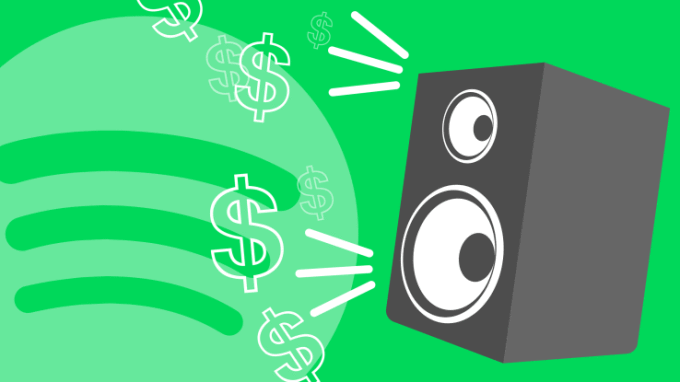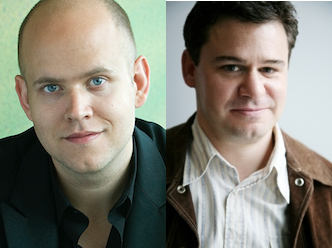The secret to Spotify’s public market debut is actually an acquisition it made in 2014. The Echo Nest was powering music recommendations for Beats Music, Rdio, Vevo, and iHeartRadio too before Spotify pulled it out from under them by buying it for a reported $100 million — 90 percent in Spotify equity. That deal paid off big time, as it’s turned the startup from a daunting search box for 35 million songs into a personalized mixtape.
Today, in Spotify’s SEC filing to go public through an unusual direct listing, the company writes that “a key differentiating factor between Spotify and other music content providers is our ability to predict music that our Users will enjoy. Our system for predicting User music preferences and selecting music tailored to our Users’ individual music tastes is based on advanced data analytics systems and our proprietary algorithms.”
That data came from The Echo Nest. 200 petabytes of user behavior data to be exact. That’s compared to the 60 petabytes Netflix had in 2016. Spotify logs 150 billion plays, shares, skips, follows, and other signals per day that tune its recommendations.
This all powers Spotify’s popular curated playlists like Rap Caviar that consume 31 percent of users’ listening time, up from 20 percent two years ago, and the Discover Weekly algorithmic playlist that keeps them stocked with music. Always knowing what to play next has helped Spotify climb to 159 million monthly active users (up 29 percent year-over-year) and 71 million paying subscribers (up 46 percent year-over-year).
Those users are loyal, spending 25 hours per month streaming Spotify’s content. Just 5.1 percent of subscribers churn out monthly — a low rate for a subscription service which has come down from 7.5 percent two years ago. Spotify accounted for 42 percent of the global streaming in in 2016, and by 2017 its subscription fees and ads earned it $4.09 billion in revenue.

But most importantly, those recommendations are what makes Spotify the go-to streaming service for serious listeners amidst an unbelievably crowded field of competition. “We believe Spotify is differentiated from other services because we provide Users with a more personalized experience, driven by powerful music search and discovery engines” writes Spotify CEO Daniel Ek in today’s letter to potential investors. With similar catalogues and playback features, its Spotify’s understanding of what we want to hear that keeps people from straying.
And there’s plenty of places to stray. Apple and Google pre-install and promote their streaming apps on their mobile operating systems, while charging Spotify a tax on subscriptions bought through its platforms. YouTube’s vast catalog of legally grey music uploads and snazzy videos appeal to younger listeners. SoundCloud offers the newest emerging artists. Amazon is using its Echo speakers and Prime subscriptions to get its music service into millions of homes. And there are still CDs, vinyl, MP3s, iTunes downloads, FM and satellite radio, and stalwart online radio services like Pandora.
But none combine the dedicated music recommendation prowess Spotify has built up with the on-demand access listeners crave and a free ad-supported tier to lure people in. “With access to unprecedented amounts of data and insights, we’re building audiences for every kind of artist at every level of fame and exposing fans to a universe of songs” Spotify CEO Daniel Ek writes in his letter to investors.
![]()
And because music lovers trust the app to tell them what to play, Spotify has managed to build up some leverage to negotiate with the record labels and rights organizations that control the content it streams. Spotify can favor whatever music it wants, replacing top 40 radio as the most crucial hit maker in the business. And its ads and subscription revenue payouts have helped turn the music industry around after MP3 piracy and unbundled $1 singles cratered the post-CD landscape. Musicians and their management are finally starting to need Spotify as much as it needs them.
That’s the only reason Spotify can go public despite being so dependent on these rights holders. Otherwise, they could just jack up their licensing and royalty rates, and if Spotify refused to pay, they could pull their music. That’s especially worrisome for a public company with all its financials laid bare. Earn too much profit, and the rights holders would just cut it down to size. But they’ll play nice since Spotify selects what becomes popular.

Spotify CEO Daniel Ek (left) and The Echo Nest CEO Jim Lucchese (right)
The democratization of music creation and distribution necessitates a new layer of curation that Spotify wants to provide. “The old model favored certain gatekeepers. Artists had to be signed to a label. They needed access to a recording studio, and they had to be played on terrestrial radio to achieve success” Ek writes. Nowadays with so much content coming out, “artists’ biggest challenge is navigating this complexity to get heard. We believe Spotify empowers them to break through.”
To keep its crown, though, Spotify will have to stay a step ahead of everyone else’s recommendations. Its public filing lists their bigger brands, bank accounts, hardware, and app stores as significant risks. While Spotify has nearly twice as many subscribers Apple Music, the competitor is growing fast by giving away free one-month trials, paying for exclusive early access to blockbuster albums, and pre-loading the app on iPhones. Apple printed $20 billion in profit last quarter while Spotify has lost $4 billion to date.
Spotify will have to not only surface the best content, but create some too. By producing exclusive in-house audio and video, it could seduce subscribers and avoid royalty pay-outs. Spotify will have to figure out not only what we want to hear, but what we want to see. By displaying better ‘behind the music’ factoids, lyrics, slideshows, and more while we listen, it could add a unique dimension to the same songs streaming elsewhere. And it must be seen as a true ally to musicians, podcasters, videographers, and beyond. By winning their hearts, Spotify could get them to promote it as the home for their content that lives elsewhere too.
Surrounded by tech’s titans, Spotify may still be the underdog in the long-run. But by becoming the world’s DJ, Spotify has established itself as indispensable to the music industry. This jukebox sounds worth your dime.
Check out all of TechCrunch’s stories about Spotify going public, and read our feature piece “How Spotify is finally gaining leverage over the labels”


